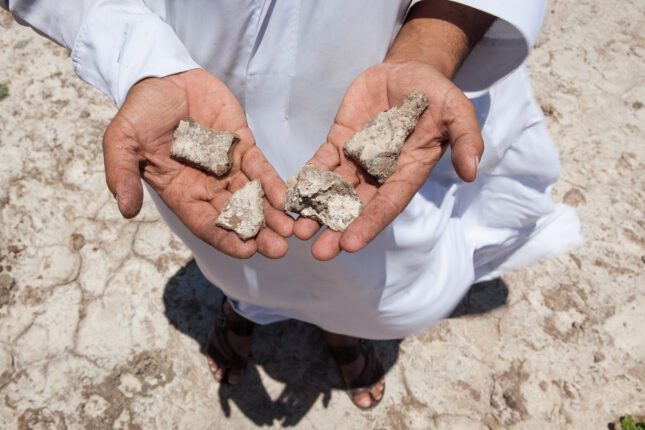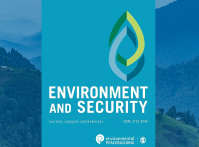-
Weakened Infrastructure and Climate Change: The Threat to Water Security in Nineveh

Iraq is incredibly vulnerable to the impacts of climate change. Temperatures are increasing, rainfall is decreasing, and the country experiences prolonged periods of drought. These conditions, as well as the destruction of wells and irrigation systems in the Islamic State’s (IS) targeted 2014-2017 campaign to destroy agricultural livelihoods, have created a growing water problem in Iraq’s Nineveh Plains. Indeed, water levels there have dropped low enough to subject crops to drought stress, endangering drinking water systems and affecting the ability to grow crops and raise livestock.
Water security is a long-term problem in the Ninevah Plains, yet as our LASER PULSE (Long-term Assistance and Services for Research / Partners for University-Led Solutions Engine) team has discovered, it has immediate and dire consequences for those who earn their livelihood from the land. One Kaka’i farmer from Hamdaniya stated in an interview that “we have had a serious drought for many years now. If there is an irrigation system, we can manage, but now we face serious problems. If it does not rain, we will lose everything we have cultivated this year.”
The Iraqi agriculture sector employs roughly 20 percent of the country’s workforce. It is the second largest contributor to the gross domestic product after the oil sector, accounting for 5 percent of Iraq’s GDP. Thus, agriculture development is critical for Iraq to achieve its vision of a more diversified economy that generates employment, and boosts private sector engagement.
Yet being heavily reliant on agriculture for household income is a challenge here. The double burden of IS’ targeted destruction and the effects of climate change have brought significant negative repercussions for the people of the Nineveh Plains.
Irrigation Shortages Endanger Stabilization Efforts
Since agricultural activities in the Nineveh Plains rely predominantly on rainfall, the lack of significant investment in ensuring water security leaves its communities exposed to repeated water shortages. It is projected that mean annual rainfall will decrease by nine percent by 2050, leading to a 20 percent decrease in available freshwater. In a survey of 892 people conducted in the Nineveh Plains by LASER PULSE in 2020, a secure water source was important to people’s feeling secure about their future.
In an additional 200 interviews with local farmers and political leaders undertaken by our team, the issue of water security was seen as a key priority. Lack of rainfall and irrigation systems was continuously highlighted as a major impediment to reinstating agricultural livelihoods post-IS which is preventing people from restoring their lives.
One Assyrian farmer from Tal Kayf told us that “we don’t have an irrigation system. It is all rainfed. When there is a delay or no rain, we are in serious trouble. And we cannot do anything about it because we have no other options.”
The Need for a Holistic Approach
Our research with farmers has demonstrated that creating water security in the Nineveh Plains requires a multifaceted approach that includes increasing groundwater, better-utilizing rainwater, integrating traditional and modern techniques, and adapting farming practices. Proactive measures across the Nineveh Plains are crucial to prevent further depletion of groundwater resources and to ensure sustainable water availability for future generations. In addition to these short-term policies, longer-term strategic measures for enhancing water availability in the region will involve taking advantage of the Tigris River and Mosul Dam by improving and extending the Al-Jazeera Irrigation Project—with a critical focus on sustainable water use.
Despite decreased precipitation, the Nineveh Plains often face flash flooding, so policies must be implemented to minimize water loss. Constructing swales and check dams are effective traditional methods for capturing rainwater, preventing soil erosion, and increasing groundwater.
The Nineveh Plains can also counter desertification, preserve soil quality, enhance water resources, and promote ecological balance by strategically planting trees and engaging in reforestation efforts. Agroforestry techniques can also prove effective in soil improvement and moisture preservation while providing additional income. Trees absorb and retain water in their roots and canopy, contributing to groundwater recharge and preventing excessive evaporation, thereby helping to maintain soil moisture levels.
Increasing surface water also allows for the more sustainable use of artesian wells as an alternative water source. Encouraging crop diversification and cultivating drought-resistant crops holds the potential to lower the demand for water resources. This approach also should include planting winter vegetables and salt-tolerant crops.
Dwindling Groundwater Requires New Techniques
Traditional methods remain important in the region, but there are opportunities to further encourage the adoption of modern and efficient techniques among farmers to ensure less wastage. Transitioning to modern irrigation methods like sprinkler, drip irrigation, and deeper artesian wells offers several advantages to agriculture sector workers across the Nineveh Plains. Farmers can drastically lower their operating expenses and contribute to sustainable agricultural practices and environmental conservation by using solar energy for irrigation and wells. And since this area already has limited electricity, it is good practice to make use of renewable energy. Government funding, technological improvements, and awareness campaigns should also encourage the adoption of solar-powered irrigation systems.
Empowering farmers with knowledge and skills through comprehensive training programs is essential to foster acceptance of new and traditional irrigation methods and ensure their successful adoption. Collaboration between local communities, government bodies, and experts is crucial in identifying and implementing effective solutions that are tailored to each locality’s unique circumstances.
Collaboration Is Key, Action Is Needed
Six years have passed since the territorial defeat of IS, but communities still have not recovered. The increasing impacts of climate change have compounded the damage done by IS. Recovery requires a collaborative effort involving government agencies, local communities, and international non-governmental agencies. Due to the multifaceted nature of these efforts, other stakeholders—including actors working across the reconstruction, climate adaptation, development, and peacebuilding fields—must also play a part.
Collaboration with local communities in the design stage is key to ensuring that policies simultaneously address needs and do not lead to tensions between communities. Our research has highlighted these dangers, as tensions arose in some places and resulted in aid competition—rooted in a perception of unfair distribution.
Our interviews with farmers and community leaders revealed that they feel sidelined and neglected. They call for the implementation of proactive and inclusive policies, as well as investment, to increase water security.
We reiterate their call. Water security in the Nineveh Plains is intrinsic to people’s livelihoods. Failure to provide it will wreak further damage on these communities, and will have multifaceted impacts on Iraqis’ well-being, livelihoods, and sustainability. Addressing water security is crucial for food security, agricultural productivity, and mitigating potential future conflict.
Nabaz Mohammed is an Associate Professor at the University of Duhok, Kurdistan Region of Iraq, with a research interest in water quality investigation and water resources management.
Dylan O’Driscoll is an Associate Professor at the Centre for Trust, Peace and Social Relations (CTPSR), Coventry University and an Associate Senior Fellow at the Stockholm International Peace Research Institute (SIPRI).
Both authors are part of the ‘Support to Traditional Cultural Practices in Northern Iraq’ project led by the LASER PULSE consortium.
Sources: DOI; FAO; Journal of Earth Sciences and Geotechnical Engineering; LASER PULSE; Relief Web; Reuters; SIPRI; World Bank
Photo Credit: Iraqi farmer laments how droughts, water scarcity, and increasing soil salinity has turned the soils of his farming lands into unusable areas., courtesy of Sebastian Castelier/Shutterstocck.com.
 A Publication of the Stimson Center.
A Publication of the Stimson Center.






